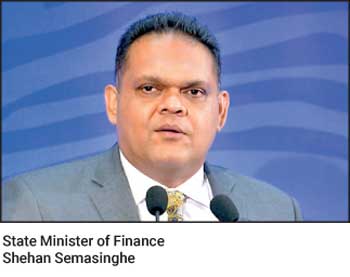Saturday Feb 21, 2026
Saturday Feb 21, 2026
Tuesday, 5 March 2024 01:43 - - {{hitsCtrl.values.hits}}
 State Minister of Fina-nce Shehan Semasinghe, yesterday outlined the critical role of social protection reform in Sri Lanka’s overall macroeconomic recovery efforts.
State Minister of Fina-nce Shehan Semasinghe, yesterday outlined the critical role of social protection reform in Sri Lanka’s overall macroeconomic recovery efforts.
He made these remarks at the launch of District Profiles of the Multidimensional Vulnerability Index (MVI), created in collaboration with United Nations Development Program (UNDP) and Citra Lab, which provides insights into the socio-economic context and vulnerability across Sri Lanka’s districts.
Semasinghe highlighted that social protection reform was pivotal not only in safeguarding the poor and vulnerable during the economic crisis, but also in enabling other challenging macroeconomic reforms. “These reforms, including tax structure adjustments and utility pricing, have contributed to restoring economic stability and laying the groundwork for sustainable and inclusive growth,” he added.
Acknowledging that the Multidimensional Vulnerability Report, launched last year, served as a foundation for policy planning at all levels, the State Minister said the newly introduced district profiles will offer deeper insights into the specific factors contributing to vulnerability in each district, highlighting the necessity for targeted support.
“The analysis conducted by the UNDP revealed that several districts lack adaptive capacity to disasters, underscoring the importance of pre-emptive action to enhance community resilience. In response, the Government has significantly increased cash transfers to the poor and vulnerable through the ‘Aswesuma’ program, ensuring more effective targeting and increased support compared to pre-crisis levels,” he revealed.
He commended the efforts of the UNDP team and Citra Lab in developing these profiles and encouraged further collaboration to address vulnerabilities effectively.
“I urge policymakers, the private sector and civil society to utilise the analysis provided by the MVI to implement measures aimed at steering Sri Lanka away from vulnerability and towards sustainable growth and prosperity,” Semasinghe said.
The State Minister also insisted on the importance of collaboration among political parties, Government agencies and civil society to utilise the district profiles and data for evidence-based decision-making and planning.
He said the economic crisis, which began in late 2021, exposed long-standing structural vulnerabilities and had severe impacts, particularly on the poor and vulnerable. In response, social protection mechanisms were revamped to address the unique challenges faced by vulnerable groups.
“Despite the challenges, early signs of stabilisation and growth are now evident in the economy. Shortages have been eliminated, foreign exchange liquidity is restored, and import restrictions have been lifted. The Government achieved a primary budget surplus in 2023, inflation declined significantly, and the country witnessed a current account surplus for the first time in decades. Economic growth has resumed after consecutive quarters of contraction,” the State Minister added.